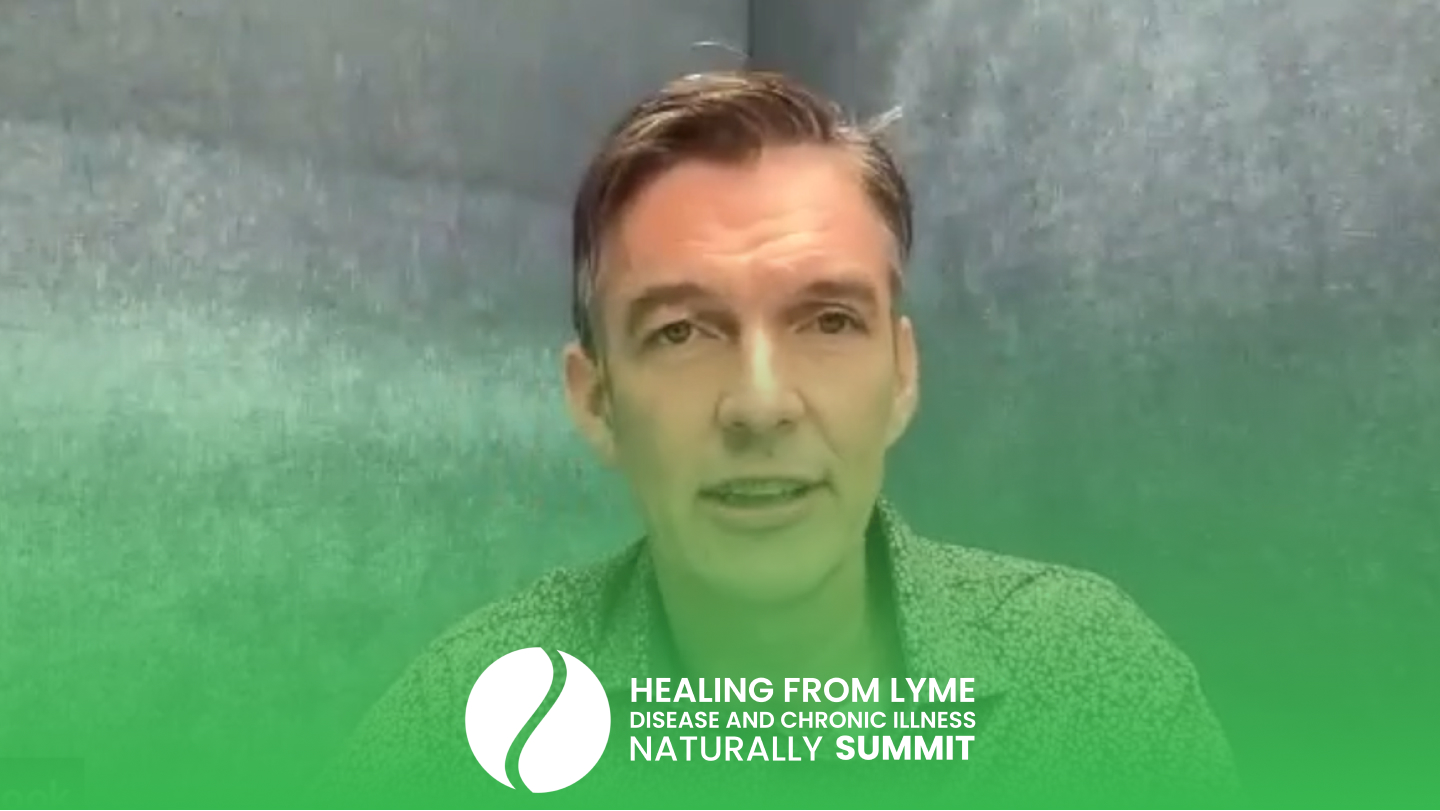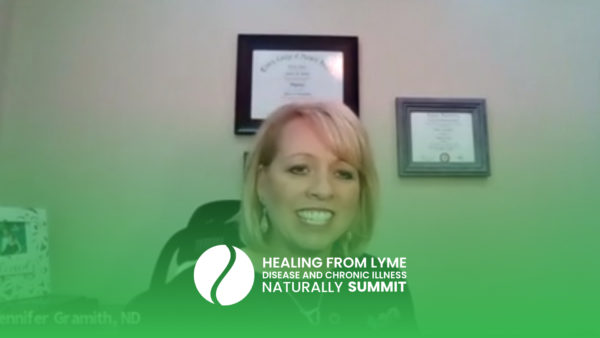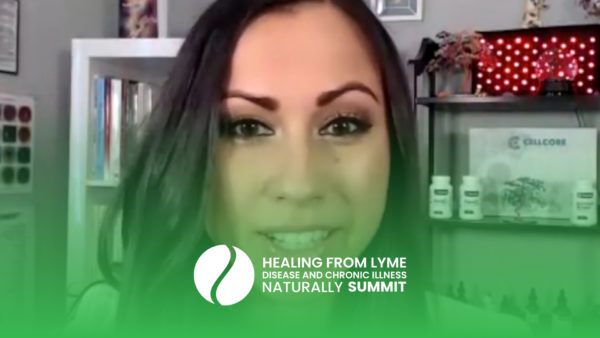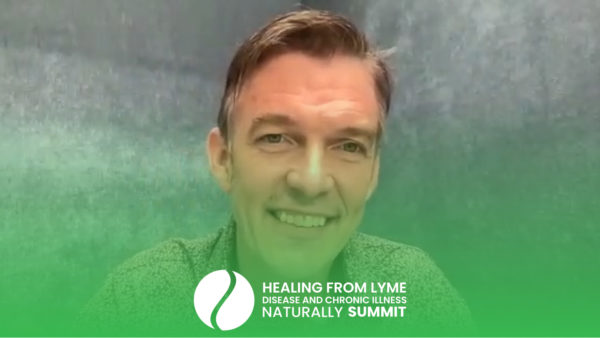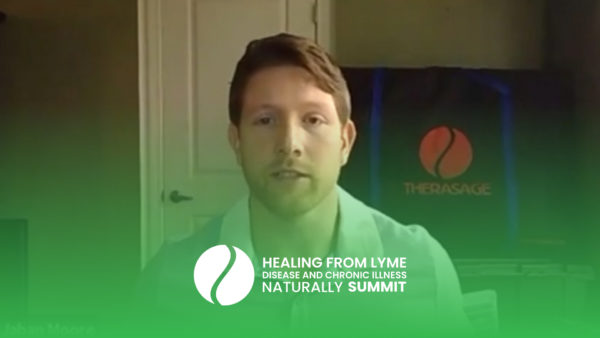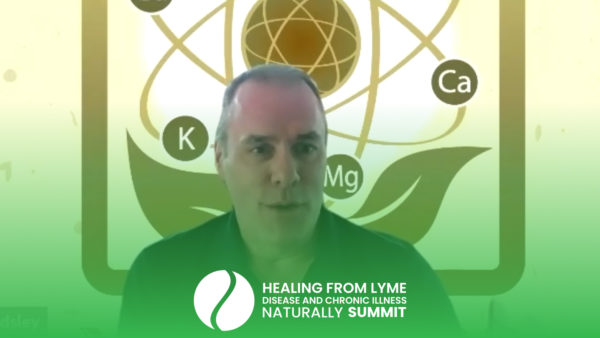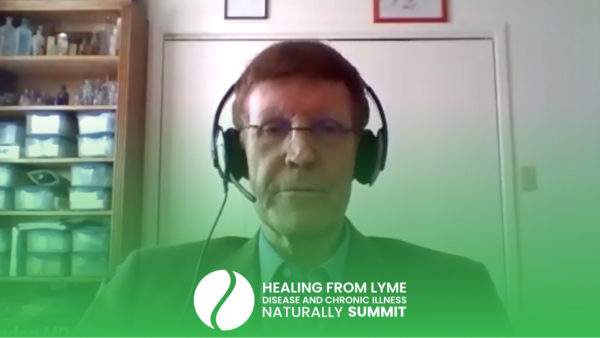Join the discussion below
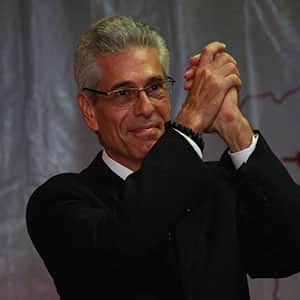
Rob Besner, PSc.D, Co-Founder and Chief Science Officer of Therasage, has always been an advocate of natural health and wellness. Graduating from Boston University in Pre-Med, Engineering, Psychology and Business, he continued onto post graduate work at Case Western Medical School and Holistic Medicine After many years of illness, Mr.... Read More
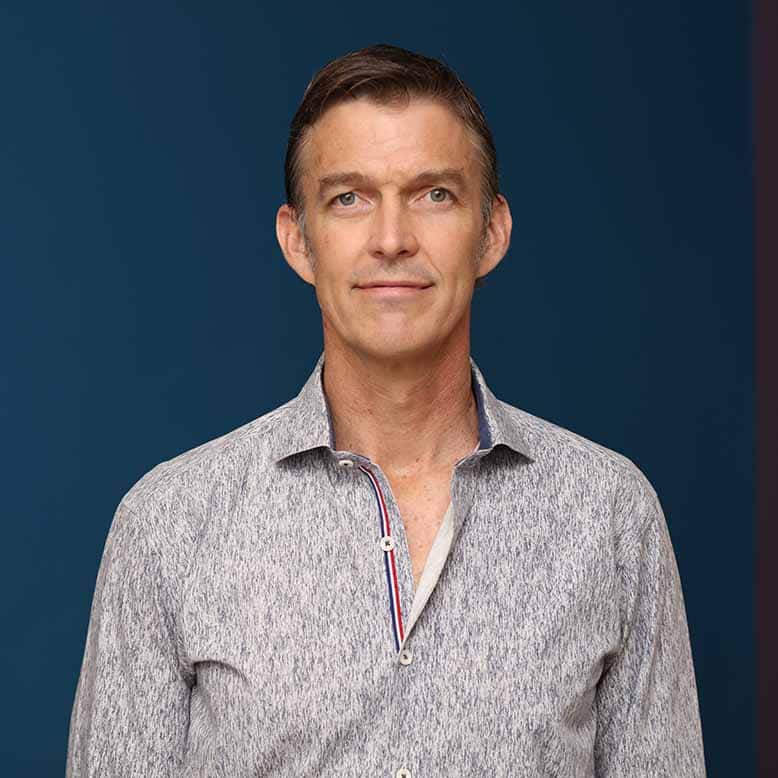
Dr. Cook is President and Founder of BioReset® Medical and Medical Advisor of the BioReset® Network. He is a board-certified anesthesiologist with over 20 years of experience in practicing medicine, focusing the last 14 years on functional and regenerative medicine. He graduated from the University of Washington School of Medicine... Read More
- Learn and attain the list of ingredients that you can utilize tomorrow to make a change in your health and well being.
- Learn how to manage and heal from lyme and/or the co-infections from one of the top practiitioners in regenerative medicine ; Speaker reveals most of the tools he uses in his treatments and protocols.
Related Topics
Chronic IllnessRobby Besner PSc.D.
It’s Robby Besner and I’m back with another great interview. I’m sorry, they’re all great, but today we have a really special guest. His name is Dr. Matt Cook. And he’s in California. And he has a really cool background, which just sort of really blends into his skillsets, that he has put all of those together into his program and his practice called BioReset Medical. But it’s really kind of an interesting platform in general, and I’m hoping he’ll take us, to dive us, a little bit deeper, unpack, some of the elements of BioReset and what makes that unusual from other practices in the way that they see the world. He started off, and probably even before that… as an anesthesiologist. But he sees a lot of Lyme patients and different kinds of chronic elements in his practice and in just chatting with them, it seems to me, he treats the whole person, in least in the platform that he has presented.
And he’s very conscious of the terrain that the… interactions of your outside micro, macrobiome and the microbiome inside of you, and then the effects of our environment and how that expresses in each of us. And it’s super critical, particularly in Lyme. And that’s what makes Dr. Cook’s approach so unusual, and also what keeps him, you know, how cream always rises to the top, well, I would like to say that about Dr. Cook. So Matt, welcome to the Healing from Lyme Summit, and I really wanna welcome you in, you have a pretty cool background I can go on for a while, but I know that you would sell a story much better than me. So give us a little backdrop as to sort of about you, how you, I think that you might’ve gone down one path as a ‘traditional’ anesthesiologist, but somehow you got some life experience might’ve diverted you into the interests of that you have today because, and also, well, I want you to spend some time on regenerative medicine, what your definition of that is. But we’ll get to that in a minute. Just talk to us about your background, and walk us forward if you want.
Matt Cook, M.D.
Thanks Robby. I’m delighted to be here. You’re sounding like the nicest guy I’ve talked to in months so. I…
Robby Besner PSc.D.
Thank you. Do I, by the way, do I owe you money on that? Because that’s a really great compliment. I appreciate it.
Matt Cook, M.D.
It actually is a really great compliment and… there’s the two nicest people that I’ve talked to, and you’re one of them. So I felt good about saying that honestly. The… I’d like to say, yeah, it’s interesting when, how I met these people that were naturopaths. I had a friend who was my kind of a mentor and rock climbing partner who was maybe 10 years older than me, and his name was Kim Barta from Montana. And so then he… introduced me to these naturopaths one of whom he was dating. And so he was super influential to me, and had taken me up all kinds of big routes and, you know, kind of had this expansive view of the world and, you know at that time people had Lyme disease in Montana. But fundamentally, nobody knew what it was, nobody in Western medicine knew what it was.
And then even if you would’ve said Lyme disease to me at that time, I had kind of, it was like a black box we didn’t know what it was. And so then I met, who turned in to be his wife, Katie and the southern naturopath, and they told me all about it, and I got so excited and I remember I went, and I told these orthopedic surgeons that I knew about it. And they were like, “That doesn’t work, it’s a fail.” And like, and so I was like, “Oh!” And I was like so, I was so young and impressionable, that I thought, “Oh God, maybe I shouldn’t do that.” Like, they really beat me down that you don’t wanna think about anything alternative.
And then I, unfortunately I kind of went into the heart of the medical industrial complex. And because we were into climbing and stuff, we came up with the idea, I should go into anesthesiology because you can take six months off and go to Everest and come back so. You know, I started doing that. The, and so I did a ton of emergency and trauma, you know, and I’m kind of so grateful I didn’t end up having to do that through COVID. But my heart goes out to those people, you know, it was, so I used to do 24 hour call and 36 hour call at the time, and it was awesome ’cause it did make me stronger, I think mentally and emotionally.
But, as an anesthesiologist, my specialty was supporting those orthopedic surgeons, and doing ultrasound guided nerve blocks where I would put fluid around nerves and put nerves, I could put a shoulder asleep, and then they could do shoulder surgery without having somebody go all the way to sleep. So then, but then immediately I started doing it and within like a year ago, I made a horrible mistake. Like, because my favorite thing about medicine is talking to people and it’s nice to talk to surgeons, but all the, all my patients were asleep and I kind of did it. It’s that kind of interesting if you’re thinking about medicine. If you really love people, you gotta do something where you talk to people all the time.
So then, I was thinking, “God, I gotta get out of here.” And so then I went back to the beginning, and I got certified in Acupuncture, and I got certified in Functional Medicine. I was kind of growing that kind of concept, and so as I was telling you before I bought a farm and I said, I’m gonna grow all my vegetables and practice functional medicine, but kind of as, I had been doing ultrasound guided injections, ultrasound guide for nerve blocks since like 2002. And so then I, you know, we found out that people were doing hydrodissection, putting fluid around nerves, but using something other than like numbing medicine using local anesthetics. And so then I… started doing that, and then kind of immediately overnight became fairly busy, you know, doing that.
And then what was interesting was is that, some of that, a good pry half of that was sports medicine, and pain. But, and then pry 20% of that, was people that had nerve pain that had Lyme disease. And so then all of a sudden, sort of I was faced with, oh, okay, this Lyme disease came back that I had been studying Functional Medicine and I’d taken some courses on Lyme disease, and… But it was still kind of a little bit of a black box, nobody really knew about it, and then again, even when you started talking to people about it, it’s not, wasn’t really accepted by the Western medical system, and so then I had a little dissonance around that.
But then I had an idea, because I’m doing like my first bid of medicine, was like, just do whatever those guys say. And then at that turned out, I was like that, and then I realized I made a mistake, and so by then I was just like 100% all in, to try to do the best I possibly could, at any cost almost. And so then, you know, it ended up. We started to have all these Lyme patients so I started going to the meetings and meeting people and kind of learning more about it. And so, and then really integrating what we do kind of on, and because I was an anesthesiologist, I also did tons of IP therapy. And so then suddenly we began to merge IP therapy and injections, and I started to add other things like peptides and regenerative medicine. And so then, you know, we ended up building a fairly robust sort of approach to complex illness.
And Lyme is part of that, but mold is part of that and other chronic viral things and so then. And then what we found, was all of the things that are helpful for those people, are helpful for people who were super healthy. Because if you can get away with doing something to somebody that has, is fairly sick with Lyme, then that’s a really good thing to do, because they generally can’t tolerate a lot of stuff. And so then, that kind of evolved, that it really the, our experience on Lyme, deeply corrected and oriented our approach to wellness. And so then it’s been, and so then it’s just been an ever evolving journey, of thinking and talking about it. And you know even, I spent like four hours on the phone this weekend talking to doctors and people at Stanford and, you know with ideas and, oh, what about this trial and kind of processing. And so it just, and it just keeps getting kind of, you know, better and better and sweeter as time goes on for me, kind of on that along those lines.
Robby Besner PSc.D.
I don’t know why this is not, but today is the blessing, curse day. And what I heard you just talk about was, the curse of Lyme disease and it’s inter-processes. And then the blessing, because it actually shifted your thinking, the contrast of treating a Lyme patient, or a patient that could be from pain management in general, or sports medicine, that angle. But then Lyme comes into the room and all of a sudden, what might’ve been kind of a straight path for you as a practitioner, all of a sudden there were lefts and right turns. It was a lot more complicated, a lot, the body response was different. The symptoms of the patient coming in were different. And so the complexities dialed up quite a bit. So as even our own, you know, sort of ‘virtual clinic’ that we have set up now, you know, we, when we talk to Lyme patients or chronically challenged people, where our body work is harnessing infrared frequencies, we put mega personas and a whole bunch of things so we focus on detoxing.
And, later on maybe in a few minutes, I’d like to just talk about the relationship of toxicity in the body and inflammation and how that plays a role and in just general overall, you know, over bearing symptoms and also maybe a road to create some kind of a map, roadmap to get back to maybe the new you, or a better version of you. So the blessing and curse thing came up. Over and over like, “I’m cursed with Lyme disease, “but the blessing is if you able to come out of the other “end of the tunnel, you’re stronger by it, “you’ve learned different techniques that can support “sustainable immune system responses that help you through “many things like the COVID scenario “that we’re experiencing now.” And so on and so forth, right? And then aside from what you experienced personally, you’re also influencing the people that love you and have supported you and their family units, and maybe even your kids.
And so there’s a lot of silver lining blessing. It doesn’t feel so great when you’re on your back haxing. But certainly if you have a little broader perspective or at least in conversations like we’re having, and people tuning in today, they can see that or hear that, they go, “Hmm, let’s look for the silver lining.” And for you, it brought you to creating an incredible primal healing platform with all these different skills and sorta tools in your toolbox that now is influencing not just, you know maybe regenerative medicine, which could have been your first foray, but now there’s applications in all kinds of infectious chronic elements. And like you just mentioned, you know, it’s not just good for the people sick, it’s also good for the people healthy, keep them healthy. Which was actually my topic of research for this year 2020 well, last year 2021 was the year for me, in my lab on optimal health.
Because from someone from your position, you can really shift someone that’s chronic ill, chronically ill. But if they’re a weekend warrior, if they’re an NFL player, if they’re really on top of their game, how do you keep them strong? Or keep the average person from getting sick, and getting kind of sucked down that rabbit hole right? And so that’s a little bit more challenging, keeping people, raising the bar on people that are already optimal in their health. So I appreciate ’cause it seems to me like you’ve seen both sides of that spectrum, and now you bring it to your daily activity. So–
Matt Cook, M.D.
So then let me go in, let me dig into this one. So then I like the, I like a lot, the idea of… The blessing and the curse. And so if your curse was something, I got we have to look for the silver lining. And so we always have these jokes. “Oh, that’s a COVID blessing. “Oh, that it’s a COVID blessing.” I mean, we had a lot of COVID blessings in the last…
Robby Besner PSc.D.
Sad to say you’re right.
Matt Cook, M.D.
Nobody told me the 2020 was gonna be a trilogy. but… If you think of, when there’s, these infections, and so the in fact we’re talking about Lyme disease is Lyme and kind of these other vector borne or tick borne, but it could be other ways that you can get it. So is a handful of infections. And so then there’s maybe some other, a handful of infections that we could kind of socially. Like and so that, like in the Lyme is like Bartonella, and Borrelia, and the Babesia kind of them big three. And the other things you think about as like Epstein-Barr and CMV. The other big one that a lot of people will have is mold. And then, you know, a lot of times people will have leaky gut and gastrointestinal issues that kind of drive a lot of that stuff. You say, “Well, what’s a group of people “that I’ve seen, that have all of those things?” I’ve seen a whole bunch of famous pro football players that have those things.
I’ve seen a whole bunch of famous high successful people that you see on TV and just think, “Oh my God, that person has a med.” And so then you realize these conditions are sort of pervasive in our society. And then my, you know, we were talking is there do I have some, an optimistic message? And I think deeply, I do have an optimistic message that… when there is some constellation of those three or four categories, and they get a little bit out of control, and we can kind of, I can talk you through the science, if you want. When they get out a little bit out of control, and they get a little bit beyond where your body has the bandwidth to manage the amount of inflammation and dysregulation that’s happening, you feel terrible.
But then, if you can regulate the immune system, if you can regulate kind of inflammation, and kind of start to decrease the inflammation in the brain, and then get your mitochondria working so you have energy, so there’s… I’m talking about categories of maybe wellness and health, a lot of times people will suddenly will start to feel a lot better. And so then, the line between being a successful football player, and being a patient, is, maybe thinner than you might think. And then even with those cases, sometimes you see people get a concussion and they recover just like nothing happened, and other times they never, they have a hard time recovering from those concussions and a lot of times, those are the ones that have. You know, other infections.
And so then, but with that, what we’ve kind of come to think of this as a process of different modalities that support biology and get us kind of get our biochemistry and get our systems working well together. Once that starts to happen, it’s not as hard as you would think to start to regulate and balance things and get to feeling better. And so then, when I was, four or five years ago, and I saw like a difficult I’m gay, so I was kind of like, “Oh man, God, that’s really stressful.” And we would put, like all my appointments for two hours, you know. And now I’m kind of, I have open-hearted kind of happy feeling about it cause I’m kinda like, “We’re probably gonna help you,” and so then, it’s almost like we’re just gonna assign a project manager to kind of help you work through the steps that you’re gonna have to do. And there’s a lot of parts that are kinda medical, but just as important, there’s a lot, if you’re listening out here, I think there’s a lot of stuff that’s kinda lifestyle.
And the lifestyle stuff that is, you know, the stuff that Robby is talking about that he does on his farm, is the stuff that I did on my farm too. And so then crowdsourcing and then community sourcing kind of a mix of that stuff as I think. Going to, and what I think is the COVID blessing, is that we’re aware of the immune system now, you know. Nobody has, unless you’ve ever been living under a rock for the last four years, you’ve heard about the immune system every single day. You know, for the last 1,000 days. And so then what’s gonna happen is I think there’s gonna be an incredible growth in a huge diversity of ways, that’s gonna lead us to make something that… makes that much easier for people with Lyme to transcend and overcome.
Robby Besner PSc.D.
But, you know, I think it comes from a lot of things you touched on. It’s not just one thing, there’s not just one enemy, that’s kill Lyme, is a family of micro organisms that live generally, when you have a balance in your biome inside, microbiome, they live, you know many people have Epstein-Barr and never get symptomatic, right? You have Streptococcus, you have cancer, you’ve got all these things going on inside your body, but yet when they live somewhat in harmony, then you go along your way with a vital force or source of life force and la-di-da. And we often get, and I’m sure you see this, “Why me, why now? Right? But, some of that has to do with our born genetics. And most of it on what you touched on is the epigenetics, the choices we make and the environment, right? Our lifestyle choices environment. And so, some of those, it may take a little bit, but some of those shifts could make all the difference in some sustainable long-term health.
I keep thinking, I actually, Matt, while I’m talking, I’m thinking of my grandmother. I was, I grew up in New York, on Long Island, but zero to three I was in The Bronx and my grandmother, used to take me by my hand, walk me down to Bainbridge Avenue. She was a dietician at Montefiore hospital, just up the block. Her refrigerator had an ice block on top. Didn’t even, wasn’t even electrified. There weren’t leftover foods. There wasn’t chemicals in food that would keep like a Twinkie has a shelf life and I have nothing against Twinkies, by the way in case you like them. But if you can have a food source, that’s got a 500 year shelf life, then you have to think a little bit about, what you’re putting in your body and these are your choices, right? So I really liked what you said earlier about having a team and having a coach, ’cause how it feels like you’re fashioning it.
Matt Cook, M.D.
Mmh, yeah.
Robby Besner PSc.D.
It was actually addressing the whole person and different choices they made and said, “Okay, you can go this route, you can go that route. “And if you go this route, we would probably gonna get “a little bit stronger. “If you continue on this route, “well that’s your choice, they may take us longer for you “to get to, you know your goal working with us.” So I’m sure that is both enlightening and frustrating at the same time in your practice because, yeah. We–
Matt Cook, M.D.
There’s a, do you know, have you ever heard of a folk singer? ‘Cause if you’re in Michigan, have you ever heard of a folk singer named Greg Brown?
Robby Besner PSc.D.
No, but–
Matt Cook, M.D.
He’s the greatest folk singer of all time basically. And he’s from Iowa, but he loves Michigan and he has this song called “Canned Goods.” And, it’s a poem, but it’s kind of a, there’s a line he goes, “When I see, when I go down to see grandma “I gained a lot of weight with her dear hands, “she feeds me plate after plate. “She cans the pickles sweet annandale “and the songs of The Whippoorwill and the morning dew “and the evening moon, I really gotta go down “and see her soon. “The canned goods that I buy at the store ain’t got the summer in them anymore.”
Robby Besner PSc.D.
Right, that’s good.
Matt Cook, M.D.
And so, it’s just kinda, it’s good, and yeah I always thought, and I and my dad, we would drive around and see him in Montana like we would follow him around like the grateful dead. But that was our, we grew all of our own food. And then that was, you know, we were talking about, you know, farming and, we, I’ll get into something kind of more serious than scientific, but you know, if you said, it, I was telling you, there’s nothing that makes me feel better, kind of almost physiologically, than what we would do is just walk down into the garden, with olive oil and raw goat, goat cheese, and balsamic vinegar and salt and eat like, you know, just picking stuff. And I now remember feeling just like viscerally totally alive. And there’s a lot of like, and interestingly, what I’ve been telling people lately, and you know, I have so happy because our, the woman who helps us clean Donna came over and she was, “You guys have such a healthy lifestyle.” She was, “How do you do it?” And we learned, kind of it was a journey of learning that I’ve this like, Katia, my teacher that taught me all this stuff, but life, but… The, it’s like… a two or three year journey, to learn all of the skills.
And, you know, if you’re out there and you’re struggling, learn how to do it and so then you only eat organic food, only eat organic meat, only eat, and then start to play with intermittent fasting on the lifestyle front. You know, I love what you’re doing with and so then this is like, to whether we wanna be super healthy, or you wanna recover from illness. So do sauna, and hot and cold. I do a hot and cold every single day. Do eat 100% organic, don’t eat any sugar ever. And so that ends except for fruit. And then I, and then when you’re going through your journey initially, a lot of times I’ll do no fruit for like a year while I, because a lot of people will have SIBO and bacterial stuff so I got kind of ideas around that. But then what happens is that lifestyle, suddenly becomes something that like, if you say, if you told me to live my lifestyle, when I was like 19, I would have thought that was kinda crazy. And now I can’t imagine not living it ’cause it’s like so easy going and kind of feels good.
Robby Besner PSc.D.
You know, it’s interesting how you put that because… it’s like that journey of a thousand miles starts with a step. So for people just turning in, you know you described it might’ve, might be overwhelming. Like I don’t, you know I’m a Lyme patient, I’m in south Florida and I don’t have a phone. What do I do? You know? But there are ways to adapt. Like when you talked about picking fresh fruit or vegetables from the farm, earlier or even just now, you know you’re really in a way communing with nature, right? You’re bringing in the, all of the organisms and all of the microbiome, that everything in your environment, when you touch that, when you touch the earth.
And if you were lucky enough to kick your shoes off, when you were going out, pulling the plants and vegetables and apples now you’re getting the earth charged. Well, you don’t have to be in Montana or on the beach or anything like that to do that. I mean, it’s winter time so if you don’t know that state, it may not be practical to kick your shoes off and go hug an Oak tree or whatever tree is outside, that’s planted into the ground. But these are all things that aren’t expensive that we can do tomorrow that could make a big difference in the way that our bodies feel. And, you know it might be a little retro, right? Big but, and you still can hug a Palm or Oak tree, even if you drive a Tesla. Can you imagine that?
Matt Cook, M.D.
Mm-hmm.
Robby Besner PSc.D.
So, okay. So the point is, is that it’s becoming aware that you need to kinda think a little bit deeper if you’re going down this road that, of not, of disease or ill health, and not just that you’re chronic or just that you wanna stay optimally healthy. What can you tweak? And what kind of hacks? What kinds of synergistic kinds of choices can you make, that would make all the difference in your long-term profile? As early as tomorrow, ’cause you can start tomorrow. But this journey of that 10,000 miles or 1.000 miles, it starts with one step. So this isn’t like, well, some of it’s rocket science, ’cause look at you, you’ve gone around and back of a few times, right? To give us important information that, you know, is multi-generational because our grandparents and their relatives when they came over from Europe or wherever, they brought a lot of that old school kind of thinking with them.
And then over time as we’ve become more modern in the U.S. then now we’re gaming faster and we’re bluetoothing this and that, and so with now, lot of information or direction from agencies to say, “You can make this choice, “but it may not be that healthy for you and this is why.” So, but do you bring it all together. And I really appreciate that, and I’m sure the patients and the Lyme people community that’s tuning in, can appreciate it also. So, looking at some of the things that you guys specialize at BioReset, one of them is a chronic inflammatory response. And when I looked at and researched a little bit of the symptoms that go along with that label, basically almost anybody walking on the planet could say, I have a part of that in me.
Matt Cook, M.D.
Yeah.
Robby Besner PSc.D.
So, but yet you have centered or centralized, on a lot of these, what would normally be dismissed by normal practitioners and certainly allopaths because it’s a little bit too difficult and I’m not interested in difficult cases I wanna make my life easier. And you seem to be the kind of person that says, “Yeah, more difficult. “Yep, that’s me, bring it more, bring it more to me. “I like the challenge.” And I liked knowing that I can really hold out the olive branch and help people that, you know, that might’ve actually been turned away in other practices, which we’ve experienced a bunch of times with our daughter. And I know that’s fairly frustrating either you’re turned away because they don’t even believe that chronic Lyme exists, which is mind boggling to me. Or that their infectious disease departments are so full, that if you already are diagnosed as chronic, not acute, they say we can’t help you so I’m sorry, you know and that’s not a great feeling if you’re the one that needs the help. So–
Matt Cook, M.D.
Okay, good. So then let me take you through a high level of how I think about SARS and then this will be where we’ll start. And so this will be, I think–
Robby Besner PSc.D.
Okay, okay.
Matt Cook, M.D.
Entertaining for you. And then just as an advertisement, ’cause I’m gonna supposed to say something that you can do whether you’re sick or really healthy, that can make you feel better. And so this is brought to you by Epic Bone Broth. I’m not sponsored by them. I just drink it every day. And I drink two of these every day, these are 100% amazing. And so then as, lately I don’t have an algorithm of we’ve been so busy, I’m not really making it, Bone Broth at home. But then, I get this delivered to the office and I drink it so it’s something easy that you can do, and I always feel better when I do it. But so then what is, and I think that this is going to evolve into a conversation that begins to explain everything, all the infections that I just discussed. But, the traditional one that it’s felt to discuss is mold. And then we have this idea that Lyme and mold are kind of on a spectrum, but then let’s say there’s a spectrum that would be Lyme and mold, but then potentially some of these other viruses and then potentially COVID.
Okay so then now we’ve got a handful of infections. And the… theory, is that if you get exposed to these infections, and then there’s some, if there’s mycotoxins in your body, there tend to be fairly inflammatory. And they cause inflammation in the brain and particularly in an area called the hypothalamus. And just to add a little texture, in yoga and there’s a form of Indian astrology called Jyotish. And so then they correlate, and this is like thousands of years old. They correlate every single part of the brain is associated with the planet. So like the thalamus is the sun, and the hypothalamus is the moon. But so then, the fact that these things disrupt the moon of the brain, that has to live large in the cosmology of this conversation. And so, mold can, cause inflammation there, and it can also cause kind of pervasively inflammation in the whole central nervous system, as well as in peripheral nerves, which is why a lot of those people were coming to see me for nerve pain or peripheral neuropathy.
And then a lot of people will also have nerve pain in the occipital complex with the stuff. It turns out, and this is kind of somewhat hot off the press mold isn’t just mold, but it turns out that it’s actually a combination of mold plus this other bacteria called Actinomycetes, that also causes neurological inflammation and also can affect the hypothalamus. And then, it leads to this kind of central pattern of decreasing hormone MSH. That has kind of pervasive effects when that’s low, it can lead to… not able to fight infections quite as well, it may lead to mass cell activation a little bit, and may lead to a leaky gut. And so more susceptibility to stuff going from the inside of your gut across into your blood vessels. And then the theory is that inflammation and kind of a lack of a regulatory balance thing kind of process happening, leads to… inflammation at a genetic level.
Now, not like, that your genes are inflamed, but because of the stress at a genetic level our ourselves go, “Man, we’re in fight or flight “we better print some fight or flight genes.” And so then, that drives us into kind of an inflammatory pattern. And so let’s do this test called the GENIE and think ‘genes,’ ‘genie,’ and it shows here you have this inflammatory pattern going on. Now, I think that this is somewhat central to what is a constellation of symptoms that people will feel because a lot of the Lyme patients will have this neuropathy and pain in the back of their head and headaches and a lot of mold and a lot of these other viral things. And I think that happens and I think that, and so then there are when that happens, then what happens is we see inflammation in the blood and there’s a lot of whole bunch of different markers that get inflamed.
We see… And then the immune system kind of is dysregulated because it’s kinda, there’s 100 fires going on, and it’d be like there was 100 kinda schizophrenia firefighters all running from one to the other, not sure what they’re supposed to do because it’s, the situation seemed somewhat out of control and that out of control is sort of physiologically what’s happening for people. Now that would be sort of an example of SARS from kind of the mold perspective. However, on the Lyme front, both Borrelia, which has one of, the kind of the linchpin kinda key main bacteria of Lyme disease. Borrelia burgdorferi, and Bartonella, really like to go to the central nervous system, and can cause inflammation there. And they also particularly Bartonella, but both of them, can kinda disrupt things and they can affect the limbic system, and so people tend to feel real poorly and not good and have depression and a lot of anxiety.
And I think that there is often a lot of overlap between the neurological inflammation of mold, plus Borrelia and Bartonella. And so then you’ll end… And then, often a lot of these people may have a history of mononucleosis ‘Epstein-Barr’ or CMV from the distant past. And so then said, and this is why traditionally, in medicine, we have not done such a great job with this conversation because what was… initially happening, is there was an idea that there would be one unifying cause for any problem that when you came in. And so that was, there was a term, you know somebody, might have 10 symptoms, but if you were a great diagnostician, you would realize, “Oh, there’s actually one thing that could cause “all of that.” And when you found that, that was like the one thing, and so diagnostically, you were trying to kind of understand everything and then think through processes, so that you could kind of find the unifying diagnosis that would explain everything.
And then we might have to call in, a backup secondary or tertiary diagnosis, but we’re really looking for one thing. By contrast, what’s happening with the chronic infections, in my mind, is a… hybrid, of something that looks a lot like SARS but it looks a lot like mold that looks like a lot like Lyme and it’s, we’re probably all somewhat on that spectrum. We’re all a little bit, and if we went on, if I came to see you in Florida and we went on a bender to Disneyland, you know, we would end up more on that spectrum if we ate cotton candy for a week, you know. And so then, and because almost all of the kind of chronic infection stuff is so multi-modal, Western medicine just hadn’t been built to think about that, process it, it wasn’t built to test it. Because this was, we didn’t have the raw view to kind of think about that and manage that. Or, and we also didn’t have visits. We had 18 minute, 15 minute, seven minute, and so then you can’t figure stuff out like that. But the, and then interestingly, COVID probably does similar things.
And so COVID probably creates, COVID can cause neurological inflammation that is probably gonna be on a similar trajectory, and COVID can manifest all, by long, the COVID long haulers. Can manifest as SARS as just as this story that I’m talking about, the kind of the inflammation of the hypothalamus and we were, and we’re not making hormones, and so as a result of that, we’re susceptible to all these problems. COVID can actually also reactivate these other things. And then if your immune system gets dysregulated and yet 100 firemen and police officers, and then they’re all running to the hills and scattered and stressed, then it’s in that setting, that everything, all of these, these actors that, ‘actors’ I say like, ‘Bartonella’ and ‘Borrelia,’ that were kind of hanging out on the edges and somewhat might be considered ‘opportunistic,’ this is their moment to step into the sun and shine.
So then given that, then my sort of rubric of how I’m thinking about this is, is that, these… the host of infections that we are talking about, have huge overlap with each other, they probably facilitate each other. And so then, managing and supporting patients, is going to only happen when we take into account everything that’s going on. And then also when we gonna take into account physiologically how those infections are causing disruption in our physiology, and then finding if we have ways to begin to go, kinda go in and reset. Reset that.
Robby Besner PSc.D.
Hence BioReset.
Matt Cook, M.D.
Yes. And we, you know, I came up with that name because we were so excited in the stellate ganglion block which is this one thing that I do for PTSD. This kind of a reset. And then, it dawned on us after we came up with the name that almost everything that we do at some level, is a bio reset. And then we weren’t, and it just happened to be lucky that… what happened is that the defining problem of our lives is something that disregulates everything. And so what we need to do now is learn these different ways to reset. And then some of them are, and, you know, somebody told me, you can’t come on a podcast and talk about an expensive thing ’cause most people can’t do that expensive thing. And, but then if you said, getting into regenerative farming and healthy lifestyle is a relatively cheap thing, as one of the most effective.
The peptides are a relatively inexpensive thing that I think a lot of people will, can begin to do and I’ll kinda tell you about that. A lot of the functional medicine is relatively inexpensive, and so then begins to lead you into lifestyle hacks that can be quite helpful. All of the low cost things like sauna and detox and all of that, and regulating heat shock proteins and stuff. And temperature are you know profoundly helpful. And then, and that is kind of like our… missionary kind of idea of getting out with all of these entry-level things that everyone can do. And then my goal is that then you can kinda begin to come in, in a targeted way and do some of the things that we do. And we’re teaching more and getting a lot, fundamentally my goal this year is to end up, well just in a way at a relatively low cost teaching people everything that we do.
So that we can achieve some scale in helping, because what the numbers were, that we thought about in terms of like, just, my only goal was just kind of get a clinic going that would go, and have enough patients to come. And now you realize the whole world is really facing kind of the biggest immune challenge of our lives. And so now we have to do a better job at, and then that’s gonna be one of the silver linings is because suddenly everybody’s aware and sharing information so that I think that’s exciting.
Robby Besner PSc.D.
Dr. Cook, thank you so much for joining us today. I, you are the, like, you know, because we didn’t know each other familiarly before this, I think that you are the diamond in the rough, in this discussion. I’m sure you’re well-read and well-versed, and well-viewed by all of your peers, as well as what you’re doing, you know, on the West Coast. But I’ve been very, very deep into the Lyme community since from my daughter, close to 30 years now. And it’s just so amazing and wonderful to meet you and to have you share your thoughts and what you see, not just from the past, but looking forward. And giving us all hope and inspiration and using unique combinations of just, really just turning the body on to do what it was meant to do, but using modern techniques to allow us all, to find our way back home. And so, thank you.
Hey everybody, it’s Robbie Besner. Thanks so much for joining us today. Please share this content with anyone that you think might benefit from it and we’re looking forward to having you with us tomorrow for another great interview.
Downloads

